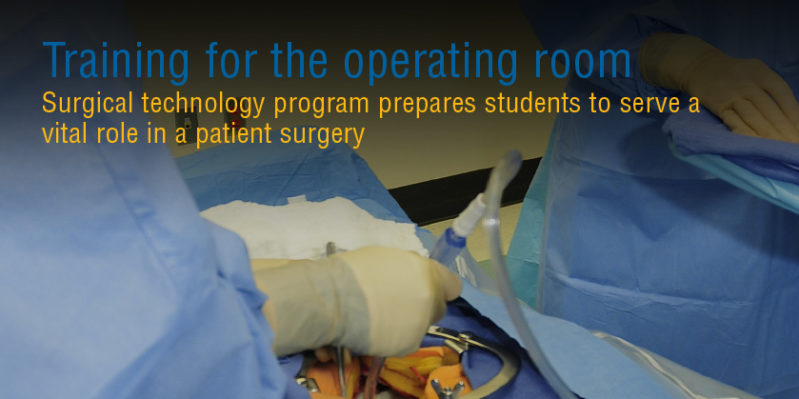
Many people find their calling in health care, and some, like Cassandra Gonzales, seek to be a part of the surgical process.
Gonzales was recently hired as a surgical technologist at Lyndon B. Johnson Hospital. Prior to graduating from San Jacinto College in August 2014, she underwent rigorous training to prepare in skills that are highly sought out, as the U.S. Bureau of Labor Statistics projects a job growth for surgical technologists of 30 percent by 2022. The aging of the baby-boom generation also is expected to increase the need for surgical technologists, because they require more surgery.
“I never thought I’d be able to get to experience what I did before graduating from the surgical technology program at San Jacinto College,” said Gonzales. “The program was very challenging, which prepared me for the field.”
Surgical technologists are trained to be an integral part of the operating room, assisting in surgeries under the supervision of surgeons, registered nurses, anesthesiologists and other team members. They help prepare the operating room by setting up equipment, instruments, sterile supplies and sterile solutions/drugs. They also assemble equipment and ensure its proper functioning and are trained to pass instruments and supplies to surgeons and assistants.
Like all of those who study surgical technology at San Jacinto College, Gonzales still remembers scrubbing into her first surgical operation, a patient’s hernia repair. She also was able to witness open-heart surgery. Her clinical rotations were done at Bayshore Medical Center, University of Texas Medical Branch at Galveston (UTMB), and Clear Lake Regional Medical Center. It is all part of ensuring that surgical technology graduates are well prepared for their work in the operating room.
“Our students perform some of their clinical rotations in the Houston Medical Center, where they are exposed to a wide variety of surgical procedures,” said Catherine Yendell, program director of surgical technology at San Jacinto College. “Our students are trained to obtain employment in hospitals, private specialty practices, as sales reps or technical specialists, in central supply or sterile processing departments.”
Yendell added that surgical technology graduates move on to make lucrative salaries within the health care industry. Gonzales will begin her career making approximately $45,000, exceeding the national average for an entry-level surgical technologist.
The College has offered training in surgical technology since 1977, and the associate degree program was introduced in 2005. The certificate program requires one year of training. Summer courses are a required part of the surgical technology program, which is accredited by the Commission on Accreditation of Allied Health Education Programs (CAAHEP), the largest programmatic accreditor in the health sciences field.
Jeannie Peng-Armao

